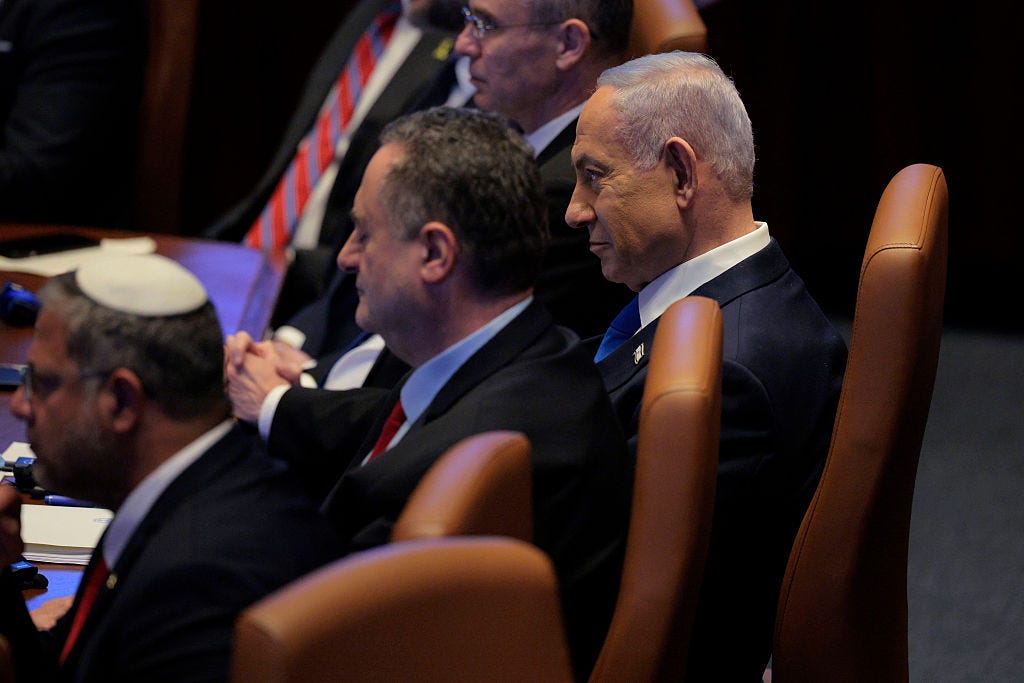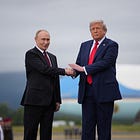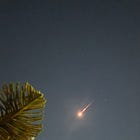Israel Must Not Turn Into Sparta
After the ceasefire, the country must choose.

For anybody who’s visited Israel, submerged themselves in the thousands of years of history there, of every form of triumph and transcendence and brutality that you can imagine, there’s one site that stands out from all the others. It’s a flat promontory on the top of an astonishingly steep precipice located at the eastern edge of the Dead Sea. It’s called Masada and it is as close as anything that nature could design to an impregnable fortress.
In a vivid passage, here is how the Roman-Jewish historian Josephus described it:
There was a rock, not small in circumference, and very high. It was encompassed with valleys of such vast depth downward, that the eye could not reach their bottoms. They were abrupt; and such as no animal could walk upon… There is also nothing but destruction in case your feet slip. For on each side there is a vastly deep chasm, and precipice; sufficient to quell the courage of every body, by the terror it infuses into the mind.
At the very end of the Jewish Revolt, four years after the Roman conquest of Jerusalem, a group of hardcore fanatics—the Sicarii—retreated to Masada and for the better part of a year heroically resisted a siege by the Roman Legion X before, in Josephus’ account, committing mass suicide. Of all the poignant symbols of Jewish statehood, there is probably none more powerful than Masada, of the absolute determination of Jews to live and die in freedom and in the practice of the Jewish religion. “Let us preserve our selves in freedom, as an excellent funeral monument to us,” Eleazar, the military commander of the Sicarii, said in Josephus’ account of the mass suicide.
It’s a story that’s very difficult to not be impressed by, and it has been at the very center of modern Israel’s conception of itself. “A generation of youth was raised by Masada,” Louis Rabinowitz wrote in a book for young adults in 1970. “This is the generation that created the state, the generation of defense in its various manifestations.” Yael Zerubavel, in a scholarly account of the phenomenon of the “Masada myth,” contends that the episode “was seen as the essence of the national spirit that made the Jews stand up and fight for their freedom.”
There are only a few problems with the story. One is that the Sicarii were utter fanatics, whose attacks—if Josephus is to be believed—were mostly confined to massacring other Jews viewed as collaborating with the Roman occupation. Then, the story of the heroic speeches and mass suicide seems almost certainly to have been a bit of poetic license. Sober archeological findings seem to indicate that the siege ended with a more run-of-the-mill battle. “There is no archeological evidence that Masada’s defenders committed mass suicide,” writes biblical archeologist Kenneth Atkinson. And then the isolated revolt was almost perfectly pointless and self-defeating. A scholarly article in the Sociological Quarterly calls it “one of the least significant and least successful events in ancient Jewish history.”
Given all that, a chill went down my spine when I read the text of Benjamin Netanyahu’s “super-Sparta” speech in mid-September where he claimed that Israel had been driven into a state of isolation on the world stage and would need to adapt by embracing that isolation, by “adapting to an economy with autarkic characteristics” and by becoming a “super-Sparta,” producing its own weapons and economic necessities and generally ignoring the outside world. In particular, Netanyahu singled out Europe, arguing that Muslim migration had led to European countries developing an “Islamist agenda” that was intrinsically anti-Zionist.
Another way to put it was that Netanyahu was adopting a “Masada Mindset.” The overwhelming sense of the speech was a belief that Israel, and Jews, have an utterly singular fate. The international community is, at core, so opposed even to the existence of Israel that Israel need not pay attention to the international community. That general indifference extended certainly to defense questions—Israel, as Netanyahu has made abundantly clear, would be the sole arbiter of its own security without interest in the niceties of international law. And that sense of proud isolation could extend even to trade—with Netanyahu, rhetorically at least, moving Israel closer to Russia, if not North Korea, in his articulation of exiting the global marketplace.
A month is, of course, a long time in politics, and suddenly everybody is singing a different tune. Netanyahu has to some extent repudiated his “super-Sparta” speech, claiming that his remarks had been misunderstood. And suddenly, against all apparent odds, a negotiating deadlock has been broken, with Jared Kushner brokering the sort of deal between Israel and Hamas that has eluded decades of negotiators, and with this year’s Nobel Peace Prize winner touting Trump as a worthy successor. The remaining hostages have returned amidst great joy, Hamas has agreed to the ceasefire, an International Stabilization Force is slowly replacing IDF positions in Gaza.
But in this mood of unexpected jubilation, we have to ask ourselves what the dynamics have been up to this point—and the critical point, as it has been really for the entirety of the conflict, is Israel’s conception of its own nationhood and statecraft. Yes, Netanyahu accepted the terms of the ceasefire, but his speech doing so was a study in ambivalence. “Hamas will be disarmed and Gaza will be demilitarized,” he said. “If this is achieved the easy way, great. If not, it will be achieved the hard way.” This is of course the same government that, only weeks ago, initiated its military occupation of Gaza and struck at Hamas’ chief negotiators in Qatar. And the very clear implication of Netanyahu’s speech was that he simply didn’t believe that any such ceasefire could hold—that in his view the international community continued to underestimate the depths of Palestinians’ hatred towards Israel and that force was the only truly effective instrument in securing Israel’s stability.
In the subtext of Netanyahu’s speech was the Masada Mindset—the vision of heroic self-sufficiency that leaves little room for liberal internationalism. In the delicate period to come, as a ceasefire takes effect—and as inevitable breaches in the ceasefire occur and both sides struggle to respond to them—the paramount issue will be whether the Netanyahu government can ward off the temptations of the Masada Mindset.
To this point, his government has not been close to doing so. In the aftermath of the October 7 sneak attack, a rational course presented itself to Israel’s government. There would, certainly, be military action in Gaza. That action would wipe out Hamas’ military leadership and reduce Hamas’ ability to stage anything like the October 7 attack for the foreseeable future and would, as Times of Israel columnist Yossi Klein Halevi wrote on the day of the attack, “restore Israel’s deterrence.” Meanwhile, Israel would benefit diplomatically from the widespread sympathy of the Western world, and the war in Gaza would end very much as in the Trump/Kushner plan, with an exchange of hostages for prisoners, with the international community active both in peacekeeping and the dissemination of humanitarian aid in the Gaza Strip.
A wide array of sophisticated observers have held that the conditions for this deal have been in place for at least a year, following the death of the October 7 mastermind Yahya Sinwar. Former prime minister Ehud Olmert held that Israel had already achieved its military objectives by May 2024. Former prime minister Ehud Barak stated last September that the war continued only for political reasons having to do with Netanyahu’s governing coalition. IDF captain Yotam Vilk, who fought in Gaza for a year, wrote recently in a New York Times op-ed, “If we went to war on Oct. 7 to save what was dearest to us, it soon became clear to me that we were fighting because our leaders were never planning to stop.” Former Secretary of State Anthony Blinken said this week, “Israel long ago achieved its war aims of destroying Hamas’s capacity to repeat Oct. 7 and killing the leaders responsible.” A New York Times account of a high-stakes cabinet meeting in April 2024 gives a vivid sense of the kinds of political pressures Netanyahu was under and how they impacted the conduct of the war. In the Times’ reporting, Netanyahu was all set to present his plan for a six-week ceasefire when Bezalel Smotrich, the far-right finance minister, threatened to walk out of the government, at which point Netanyahu hurriedly denied the existence of his own plan. “No, no, there’s no such thing,” he told his cabinet.
Under pressure from hard-liners like Smotrich and Itamar Ben-Gvir, the national security minister, Netanyahu continually stalled the Biden administration in its pursuit of a break in the fighting. A fragile ceasefire in early 2025, marred by violations on both sides, ended after two months with Netanyahu launching a surprise attack and declaring, “Israel will, from now on, act against Hamas with increasing military strength.”
Beneath everything in Netanyahu’s conduct of the war—beneath the coalition politics, beneath the details of ceasefires agreed to and then broken—is one fundamental view of statecraft: that it is force alone, steadfastly applied, that can guarantee security. But a policy like this has real repercussions. Two years after the effusion of sympathy from the rest of the world, Israel has found itself more alone than it has been in memory—with the International Criminal Court issuing arrest warrants for Netanyahu and his former minister of defense; with a wave of countries such as France, the UK, Canada, and Australia recognizing Palestine as a state; with the European Union moving towards trade restrictions against Israel; with support for Israel plummeting even in the United States, with, at the time of writing, a majority of Americans opposing continued military aid to Israel. Netanyahu’s “super-Sparta” speech was a symptom of a much larger issue—a confirmation of Israel’s isolation on the world stage—and, for many Israelis and friends of Israel, none of that was necessary. As Yair Lapid, the leader of Israel’s opposition, put it: “Isolation is not fate. It’s the product of a wrongheaded and failed policy by Netanyahu and his government, who have turned Israel into a third-world country.”
The sudden about-face by the Trump administration in pushing for a ceasefire—a response, apparently, to the extremity of Israel’s actions in bombing Qatar—is a gift to Israel that restrains the Netanyahu government from its own worst impulses. But those impulses are still there. If, on the one hand, there is a view of Israeli nationhood that holds that Israel is one nation amongst a community of nations and that its success will tend to rise or fall by the esteem with which it is held by the rest of the world, there is another view that Israel has a fate entirely of its own, that the rest of the world can’t possibly understand the Jewish spirit of ceaseless vigilance and self-defense, and that Israel’s ultimate survival is contingent only and entirely on heroic self-sufficiency. That is the Masada Mindset. It has a very deep resonance in Israel. It has been uppermost for two years and, if it has contributed to military successes on a wide front from Lebanon to Iran, it has also had its dire consequences in the court of international opinion. Just as has been the case since October 7, Israel’s long-term survival hinges on the ability of society and the government not to give in to this mindset.
It may be facile to make too much of the Masada metaphor, but I can’t help but be haunted by Josephus’ depiction of the morning after the suicide when the Romans continued with their planned assault only to discover “nobody as an enemy, but a terrible solitude on every side, with a fire within the place as well as a perfect solitude.”
As an American Jew with deep emotional ties to, and family in, Israel, the particular terror I have is of Israel giving in to the Masada Mindset that is so central to Israeli nationalism but also so self-destructive. Over the past two years, it has alienated Europe, perhaps irrevocably. Israel is fortunate to still have a friend in the United States—and a friend that is willing to push through a ceasefire deal and to put U.S. troops in harm’s way to help maintain it—but the preservation of the ceasefire will hinge, likely more than anything else, on Israel’s ability to show restraint when and if breaches occur. It will be not only a lost opportunity, but an immense tragedy, if Israel once again gives in to its nationalistic impulses and to the belief that it’s possible to go it alone.
Sam Kahn is associate editor at Persuasion and writes the Substack Castalia.
Follow Persuasion on Twitter, LinkedIn, and YouTube to keep up with our latest articles, podcasts, and events, as well as updates from excellent writers across our network.
And, to receive pieces like this in your inbox and support our work, subscribe below:





A good article and from a fellow Jew, expressing the view common in those left of centre politically. There will be many who agree with the sentiments expressed.
However, there are those who will point out that the world response to what happened on that October, 7th, the sympathy expressed was, at best "lukewarm" in support of Israel. This was also witnessed in the demonstrations of so called Palestinians in the capitals of Europe, American and Canadian cities and on the college compasses of the western democracies, that unequivocably illustrated deep rooted Islamophobia and that that antisemitism was alive and thriving in the populace of the western democracies.
The lies spread by MSM, of "starving" of the Gaza people, even the mouthing of "genocide" was rampant in the MSM and uttered by their ruling classes of the west, including in Canada. It was known that Hamas had been stopping shipments of food and medicines, bound for the Gazan people. But still the attacks on Netanyahu continued.
Even the ruling class of the western democracies, Biden and co. plus the MSM condemned Israels' invasion of Gaza, Israels' attack in Qatar of Hamas operatives, and the continuation of the clearing out of Hamas in Gaza. Again the MSM slammed the next wave of Israels invasion of Gaza as OTT and the MSM filled their pages full of anti Bibi and anti-Israel propaganda saying that "Israel has "lost the room," in this matter.
The coming of Trump, little changed the attack by the MSM and the ruling classes of the west, whose leaders even went so far as to again resurrect the utterly unobtainable, "two state" solution and unbelievably they announces their support for a "Palestinian State," which was more than delusional, it was fanciful and unrealistic as there is no such sovereign country in the world.
That Trump and his team has engineered a cease fire, is frankly amazing, judging by the political forces arraigned against him and his administration.
The good will for Israel in the wake of October 7 can literally be measured in days, if not hours. And while it was always possible for a good faith actor to challenge Israel's conduct of the war, there were precisely zero good faith opponents on the stage. Opposition to Israel, from the very beginning, was based on facile lies spread by the Hamas and Iran's useful idiots.